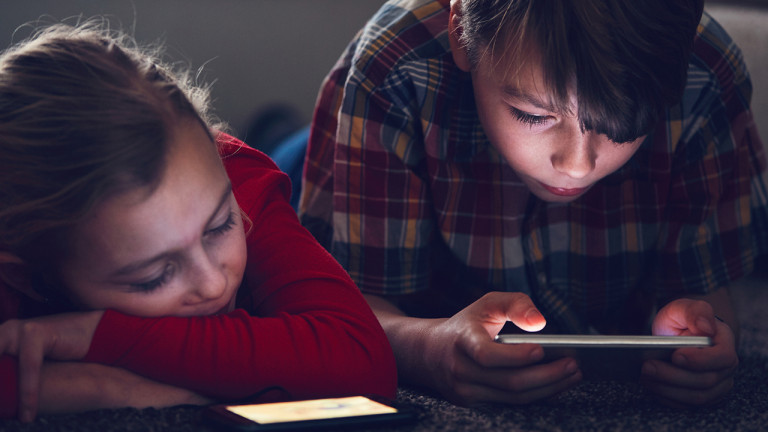Is Screen Time Good or Bad for Young Kids?

It’s no secret that screens play a big role in our lives. We use them for work, entertainment, and staying connected with friends and family. But what about our kids?
Some experts say that screen time can have benefits for young kids. For example, it can help them learn new things and stay connected with friends and family. But other experts say that too much screen time can have negative consequences. It can lead to problems with attention, sleep, and social skills.
The truth is, it depends on how your child uses it. If your child uses screens in moderation and for positive purposes, then it can be helpful. But if your child uses screens excessively or for negative purposes, then it can be harmful.
Tips to ensure that your child’s screen time is positive
1. Limit the amount of time your child: CrunchGrade tutors recommend that screen time for preparatory school and kindergarten students should be limited to one hour per day.
Kids in primary school (up to Year 6) may be able to handle two hours per day. Secondary school students (Year 7 to Year 10) can be allowed three hours of screen time. Senior secondary school students (Year 11 and Year 12) should have a maximum of four hours per day.
2. Make sure your child is using screens for positive purposes: Screen time can be helpful for kids if it’s used for positive purposes, such as entertainment, learning, and staying connected with friends and family. But if it’s used for negative purposes, such as playing games or watching TV for hours on end, it can be harmful.

It is not easy to keep an eye on children 24×7. But academic experts on online tutoring websites have some wonderful suggestions to check what content your kids are consuming. You can:
- Install a content filter on your child’s devices: A content filter is software that can block certain types of content from being accessed on a device. There are many different content filters available, so you’ll need to find one that works for your family.
- Monitor your child’s screen time: You can use screen time tracking apps to see how much time your child is spending on their devices. This can help you see if they’re using their devices for positive or negative purposes.
- Talk to your child about their screen time: It’s important to talk to your child about their screen time use. This can help you understand why they’re using their devices and how they can be used positively.
Screen time is a part of our lives, but it’s important to make sure that it’s used in moderation. If you have concerns about your child’s screen time, talk to a professional who can help.
3. Introduce your kids to informative and interesting digital content sources: Tutors at CrunchGrade recommend school students to explore online resources such as websites, apps, games, and videos that have been curated by teachers and therapists. These resources will help kids learn new things in a fun and engaging way.
For primary school students, online tutoring websites recommend content that is a mix of educational and entertainment. Kids can learn about different topics while also enjoying themselves.
As kids get older, they can start to explore more independent learning opportunities. There are many online courses and resources available for secondary and senior secondary school students. These resources can help kids stay ahead in their studies and prepare for exams.
Online tutoring websites like CrunchGrade provide a wealth of resources for parents and kids to use responsibly and enjoyably with screen time.
How to protect children and teenagers from the negative effects of screen time?
Many studies prove that screen time can impact young children and teenagers negatively. The common side-effects of too much screen time are:
1. Behavioural problems: Kids who spend too much time on screens can have difficulty paying attention and controlling their emotions. They may also act out more often. If you notice that your children can’t focus on a task or seem more irritable than usual, screen time might be the cause. In such a case, you should limit their use of screens.
If a child throws tantrums when you take away the device, it is best not to give in. The child will learn that this behaviour gets him what he wants and it will be harder to break the habit later on.
2. Falling grades: Too much screen time can also lead to poor grades in school. This is because kids who spend a lot of time on screens are usually not engaged in other activities, such as studying or reading. To avoid this, make sure your child has a balanced lifestyle that includes enough time for screen-free activities.
Online tutors at CrunchGrade suggest that students in Years 6, 7 and 8 should read books for at least 30 minutes each day to improve their grades. They also recommend strategies like the Pomodoro technique and using a study timer to help students focus while they study.
3. Physical health problems: Kids who spend too much time on screens are more likely to be overweight or have problems with their vision or posture. They may also get less exercise if they’re spending most of their time in front of a screen. To avoid this, make sure your kids get plenty of physical activity.

Some of the must-do exercises for kids who study online for extended hours are:
- Eye exercises: To relieve strain from the eyes, kids must do some basic eye exercises every 20 minutes. This will help improve their vision and prevent headaches.
- Neck and shoulder stretch: It is also important to do some neck and shoulder stretch every 20 minutes to avoid stiffness.
- Wrist and hand stretch: To avoid problems with the wrists and hands, kids should do some basic wrist and hand stretches every 20 minutes.
- Ankle circles: Doing ankle circles every 20 minutes will help improve blood circulation in the feet.
4. Sleep problems: Excessive screen time can disrupt sleep patterns and lead to insomnia. If your children are having trouble sleeping, limit their screen time before bed. If your children’s bedtime is 9 pm, then their screen time should end at least one hour before that.
5. Depression and anxiety: Studies have shown that kids who spend too much time on screens are more likely to experience depression and anxiety. This is because screens can be addictive and leave kids feeling isolated or down. If you’re concerned about your child’s mental health, you should consider taking the help of a therapist.
